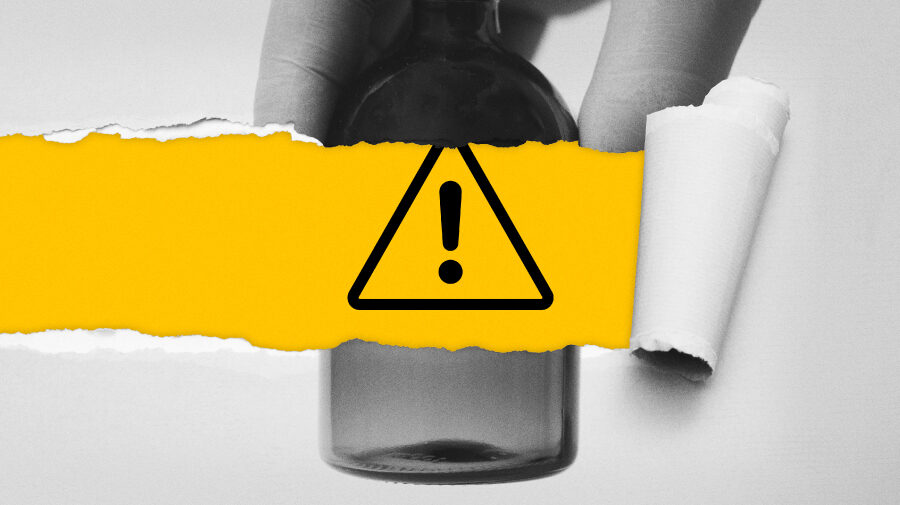Background
From the start of the pandemic, the self-described alternative health group Coalición Mundial Salud y Vida (Comusav) has shared content with anti-vaccine sentiment online, particularly in its promotion of chlorine dioxide, also referred to as Miracle Mineral Solution (MMS). Chlorine dioxide has been declared toxic; the FDA first warned about the dangers of ingesting the chemical compound in 2010. Chlorine dioxide is primarily used for the treatment of swimming pools and bleaching in the paper industry; however, Comusav continues to tout MMS as a curative and prophylactic treatment for Covid-19 on social media platforms.
Ingestion of chlorine dioxide leads to hospitalization and death
The first mentions of Comusav on social media appeared in May 2020 on Facebook and Twitter, with posts inviting users to a free webinar via YouTube. Events such as these are the backbone of Comusav’s outreach strategy, with a variety of self-declared experts presenting emotional testimonies to promote MMS. According to its website, which features content in 20 languages, the group’s mission is to “awaken the consciousness of all people” and “achieve the Physical, Emotional, Mental and Spiritual well-being of the human being.”
Last August, Argentine TV presenter Viviana Canosa drank what she claimed to be a bottle of MMS during the broadcast of her TV show “Nada Personal.” Canosa’s actions were widely criticized and marked a turning point in the media’s role in promoting false Covid-19 remedies. The national conversation became a continent-wide issue when a 5-year-old boy in the Argentine province of Neuquén died after his parents gave him MMS as a preventative against Covid-19. This took place just ten days after Canosa publicly promoted MMS. The death of the child was not the only fatal case in Argentina. According to Chequeado, a 51-year-old man died after ingesting a liter and a half of the MMS solution on August 11, just six days after Canosa’s TV episode. Two other women were hospitalized after drinking MMS. Legally, MMS has been banned in Argentina since 2017. Despite the fact that several South American countries have warned about its danger, former Bolivian Minister of Health Edgar Pozo declared its use “permitted,” and in October, the Bolivian Senate approved a law to cancel tariffs on chlorine dioxide imports.
Though some of Comusav’s Facebook pages have been deleted, the group continues to thrive on alternative platforms
According to Business Insider, Facebook cracked down on Comusav’s activity, which resulted in the closure of the group’s main Facebook page. Comusav Pages for Argentina and Mexico were deleted as well. However, a new Page is currently available on the platform. Other Comusav Pages, with various regional names, are still active. Comusav Ecuador and ComusavLive are still on the platform, despite there being no new content since February. The Facebook Page Comusav Spain is active and promoting weekly events. Similar to other disinformation agents, Comusav’s Telegram channel is the group’s main source of information; there it promotes events and posts short videos. One of the most popular posts is a video of Mexican TV presenter Verónica del Castillo’s interview with Dr. Manuel Aparicio, a physician and MMS advocate. In an interview posted to both Telegram and Instagram, the doctor suggests people should double the amount of MMS they are consuming to confront new strains of Covid-19.
Following the deletion of Comusav YouTube channels, the group migrated to other platforms, adopting fringe social networks, such as Orbys, to stream webinars and other events. On YouTube, a simple search for the words “Jim Humble” turns up three promoted results, with the first suggesting that MMS cures breast cancer. On Amazon, a search for “miracle mineral solution” yields two promoted results for MMS, despite the fact that the FDA has warned consumers about the risks.
Influencers who are advocates of chlorine dioxide (MMS)
Fringe religious leader, former Scientologist and MMS advocate Jim Humble has been promoting MMS since the 1990s as a cure for malaria. Humble is one of chlorine dioxide’s biggest advocates and has repeatedly claimed that MMS cures HIV, autism and other conditions. Humble does not have any active social media channels, but videos where he is featured have become popular on platforms such as Telegram and YouTube. The social media platforms of Comusav and Andreas Kalcker, a self-described health researcher and prominent member of Comusav, share posts about Humble, referring to him as “Master.” According to a 2016 investigation by a Los Angeles television station, Humble and his associates hosted seminars to promote MMS in the US. Organizations such as the Autism Society have responded strongly to the misleading statements by Humble and the Genesis II Church of Health and Healing, where Humble is an “archbishop,” stating that the use of MMS in people is “not only barbaric, it is morally and ethically unacceptable.” Humble does not have any active social media channels, but videos where he is featured have become popular on platforms such as Telegram and YouTube.
Kalcker posts videos that promote MMS in Latin America and Spain, and his content is often reposted on Comusav’s social media channels. Videos where Kalcker states MMS is the cure for Covid-19 and diabetes became popular in Spanish-speaking countries, where fact-checking organizations such as maldita.es in Spain and Chequeado in Argentina warned that his statements were false. Like Humble, Kalcker has promoted MMS for years; according to Spanish publication Periódico de Ibiza, he was arrested in 2012 on allegations of selling MMS without authorization. In 2018, a conference featuring Kalcker in Alicante, Spain, was canceled amid pressure from medical professional organizations, according to El País.
Kalcker uses Telegram as his main point of communication. In his channel, he shares messages with anti-vaccine sentiment, which simultaneously promote the use of MMS. In a post shared March 8, a woman promotes MMS over a vaccine as an act of medical freedom. In another message, Kalcker shared a video where a woman in late-stage pregnancy suggests MMS as a cure for urinary tract infections. Kalcker also has a profile on lbry.tv, a platform similar to YouTube, where he shares videos about MMS in several languages. The most popular video on the channel is an hourlong documentary called “Forbidden Health,” the same title as Kalcker’s book on MMS.
Mark Grenon, founder of the Florida-based Genesis II Church of Health and Healing, has frequently promoted MMS as a religious sacrament. Both Grenon and Humble were banned from YouTube in 2019 after the publication of a Business Insider investigation. The article exposed the disinformation ecosystem of hundreds of YouTube channels promoting MMS. YouTube subsequently updated its policies on harmful or dangerous content to include MMS as “content that’s not allowed.” As a result of Operation Quack Hack — an FDA effort to combat unproven medical treatments — Grenon’s Florida home was raided in July 2020. Grenon and one of his sons were eventually arrested in Santa Marta, Colombia, in a joint operation between the US and Colombian governments. According to a court filing (Page 3), Grenon’s family received at least $123,000 a month from MMS-related sales off the promotion of MMS as a cure for Covid-19. The arrest of the Grenons marked an opportunity for other groups to market false remedies in the US.
Comusav vaccine misinformation, once primarily in Spanish, is now proliferating in English.
MMS is well-known in Spanish-speaking countries, but its popularity is not as great in English-speaking countries. Several governments in South America and Europe, such as Colombia, Spain and Ecuador, have warned about the dangers of consuming MMS and have health alerts in place, specifying that MMS should not be ingested and that it can be harmful to health. Kalcker has begun to spread misinformation about MMS in English, appearing on a podcast with Australian celebrity chef Pete Evans, a conspiracy theorist known for his anti-vaccine sentiment. In December, Comusav organized its first webinar completely in English, featuring MMS advocates from Mexico, Bolivia and Colombia, and hosted by Verónica del Castillo, who posted about the event on her Instagram Page. At the same time, the Spanish-speaking Comusav Telegram channel featured another channel dedicated to promoting MMS in English, targeting a US-based audience. The Telegram channel, called “The Universal Antidote,” has videos in English where alleged experts promote MMS under the term “universal antidote.” The chat redirects to a YouTube channel and a link to BitChute and Rumble. The videos feature prominent Comusav members, such as Dr. Pedro Chávez and Dr. Manuel Aparicio, the same physicians who took part in the Comusav English-language webinar.
How public health experts have responded to Comusav and MMS
The ecosystem of fact-checking organizations in Latin America has repeatedly debunked misleading narratives surrounding MMS. The Pan American Health Organization has also generated content in English and Spanish to counter the use of MMS. A handful of countries — with the exception of Mexico and Bolivia — have actively worked to ban MMS. Canada has banned it since 2015. In the United States, the FDA and CDC have warned about the dangers of ingesting MMS. Even some states, such as Georgia and Tennessee, have put local alerts in place. Despite this, MMS and many of those who commercialize it have eluded prohibitions and decrees, causing deaths, hospitalizations and irreversible health conditions across the Americas. The data deficit is most notable in English-speaking communities. Given the ease of acquiring the toxic compound in places such as the United States, where it can be bought with a click through online retailers, local, community and national media have the opportunity to present useful, factual information to counter misleading narratives — with the potential to save lives. Community organizations, places of worship and local governments can use their platforms to warn about the dangers of Comusav, the group’s different iterations and how MMS can be harmful to the community.






